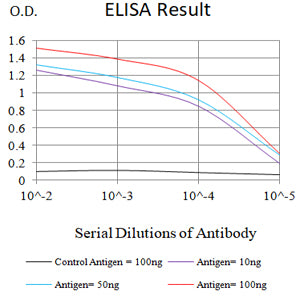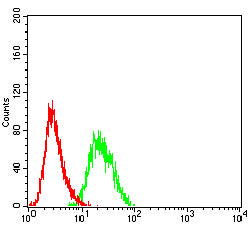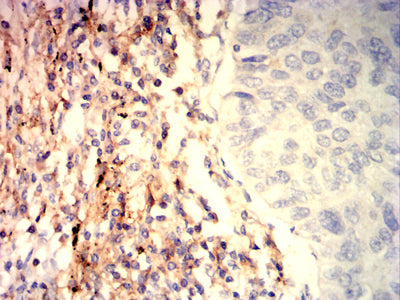


| WB | 咨询技术 | Human,Mouse,Rat |
| IF | 咨询技术 | Human,Mouse,Rat |
| IHC | 1/200-1/1000 | Human,Mouse,Rat |
| ICC | 技术咨询 | Human,Mouse,Rat |
| FCM | 1/200-1/400 | Human,Mouse,Rat |
| Elisa | 1/10000 | Human,Mouse,Rat |
| Aliases | p75; QA79; AIRM1; CD328; AIRM-1; CDw328; D-siglec; SIGLEC-7; SIGLECP2; SIGLEC19P; p75/AIRM1 |
| Entrez GeneID | 27036 |
| clone | 6G8B10 |
| WB Predicted band size | 51.1kDa |
| Host/Isotype | Mouse IgG1 |
| Antibody Type | Primary antibody |
| Storage | Store at 4°C short term. Aliquot and store at -20°C long term. Avoid freeze/thaw cycles. |
| Species Reactivity | Human |
| Immunogen | Purified recombinant fragment of human CD328 (AA: extra(19-142)) expressed in E. Coli. |
| Formulation | Purified antibody in PBS with 0.05% sodium azide |
+ +
以下是关于CD328(Siglec-7)抗体的3篇参考文献的简要列举:
---
1. **文献名称**:*Molecular Cloning and Characterization of Siglec-7. a Novel Sialic Acid-Binding Lectin*
**作者**:Angata T., et al.
**摘要**:该研究首次克隆并鉴定了Siglec-7(CD328),解析了其作为抑制性受体的结构特征,发现其通过结合唾液酸配体调控自然杀伤细胞(NK细胞)的细胞毒性功能,为后续抗体开发奠定基础。
---
2. **文献名称**:*Siglec-7 Antibody Attenuates NK Cell Inhibition in Tumor Microenvironments*
**作者**:Ikehara Y., et al.
**摘要**:研究利用抗CD328抗体阻断Siglec-7与肿瘤微环境中唾液酸化配体的结合,证明可逆转NK细胞的抑制状态,增强抗肿瘤免疫应答,提示其在癌症免疫治疗中的潜力。
---
3. **文献名称**:*Siglec-7 Expression in Colorectal Cancer and Its Association with Immune Evasion*
**作者**:Hudak J.E., et al.
**摘要**:通过抗CD328抗体检测结直肠癌组织中Siglec-7的表达,发现高表达与不良预后相关,机制涉及肿瘤细胞通过唾液酸修饰逃逸NK细胞监视,为靶向治疗提供依据。
---
**备注**:实际文献可能需要通过PubMed或Google Scholar以关键词“CD328 antibody”“Siglec-7”进一步检索。部分研究可能聚焦于基础机制或转化应用,可根据需求筛选。
CD328. also known as Siglec-7 (sialic acid-binding immunoglobulin-type lectin-7), is a transmembrane protein belonging to the Siglec family of immune regulatory receptors. It is primarily expressed on natural killer (NK) cells, subsets of T cells, and other immune cells. Structurally, CD328 contains an N-terminal immunoglobulin (Ig)-like domain that binds sialylated glycans on neighboring cells, followed by transmembrane and cytoplasmic regions with immunoreceptor tyrosine-based inhibitory motifs (ITIMs). These motifs enable CD328 to transmit inhibitory signals, dampening immune cell activation upon ligand engagement, thereby preventing excessive immune responses.
CD328 antibodies are tools designed to target specific epitopes on this protein, facilitating its detection and functional studies. Researchers use these antibodies in flow cytometry, immunohistochemistry, and Western blotting to analyze CD328 expression patterns in health and disease. In cancer biology, CD328 has gained attention due to its role in immune evasion; tumors often upregulate sialylated ligands to engage inhibitory Siglecs like CD328. suppressing NK cell-mediated cytotoxicity. Blocking CD328 with specific antibodies has shown potential in restoring anti-tumor immunity in preclinical models. Additionally, CD328 antibodies are explored in autoimmune and infectious disease contexts, where dysregulated Siglec signaling may contribute to pathology. Their therapeutic and diagnostic applications continue to be an active area of investigation in immunology and oncology.
×